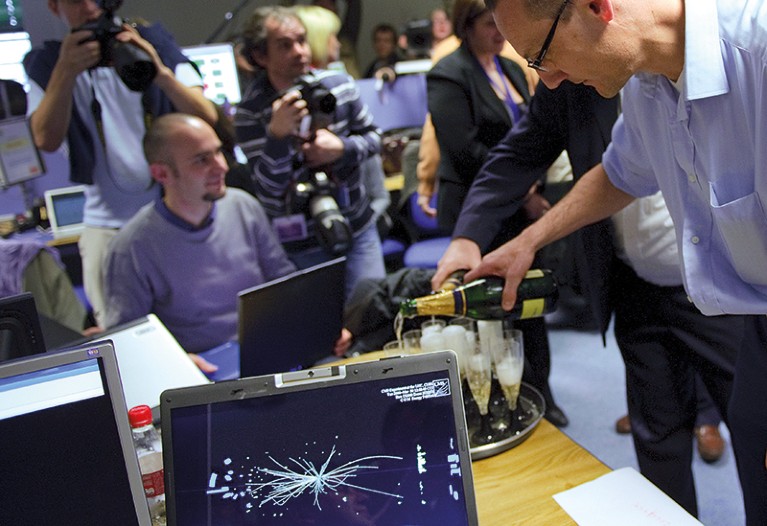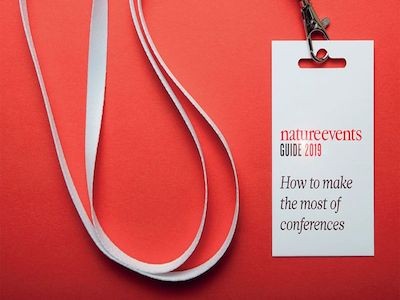
Scientists celebrated after colliding protons at record energies in 2010 at CERN, Europe’s particle-physics laboratory in Geneva, Switzerland.Credit: Fabrice Coffrini/AFP via Getty
In October, the Geological Society of America hosted its annual conference in person, with a new rule — there would no longer be alcohol allowed in the oral or poster session areas. The decision, which stemmed from a recommendation from the society’s committee on diversity in the geosciences, aimed to ensure cultural inclusivity and safety at these events. “We discussed sensitivity to different cultures, different religions, health reasons — there’s a lot of reasons why you don’t necessarily need to be walking around a professional setting with alcohol,” says Vicki McConnell, the society’s executive director.
Other scientific societies, laboratory leaders, and early-career researchers are having similar conversations regarding the role of alcohol at conferences and in the scientific workplace, as well as its potential effects on safety and inclusion. As pandemic restrictions ease in many parts of the world, enabling a return to in-person events, will alcohol loom as large as before at networking events and social gatherings?
“I think alcohol tends to be pervasive in science,” says Gabi Serrato Marks, who earnt a PhD in geoscience in 2020 and is now a senior programme coordinator for post-baccalaureate initiatives at the Broad Institute of the Massachusetts Institute of Technology and Harvard University in Cambridge. She notes that alcohol is often present at university happy hours, conferences and poster presentations, and during fieldwork. “I have only ever had negative experiences when other people are drinking, and I almost never drink alcohol in the workspace or an academic space, just because I’m already working really hard to be there,” she says.
During the second year of her PhD programme, Serrato Marks was diagnosed with Ehlers–Danlos syndrome, a connective-tissue disease that made it challenging for her to work in the lab, conduct fieldwork and attend conferences. “Adding alcohol to that just drains even more energy from me,” she says. Although she occasionally enjoys a drink at the weekend, Serrato Marks thinks that alcohol consumption should be separate from work.
She is not alone. “In the past 10–20 years, there have been really big shifts in terms of the perception of the appropriateness of alcohol in the workplace,” says Ann Roche at Flinders University in Adelaide, Australia, who studies the public-health aspects of alcohol and drugs in the workplace.
An inebriated culture
When Roche was a PhD student at the University of Newcastle in Australia in the early 1990s, she was embedded in a boozy culture. “Everybody would go out to the Staff House at lunchtime and drink, and then often go to the Staff House again after work,” she says. The Staff House had a bar, provided meals, and served as a venue for social functions. These days, she says, that behaviour would be really rare.
Although most scientists today aren’t drinking during work hours, alcohol is often still present in labs and scientific settings. Researchers raise a toast to celebrate milestones such as earning a grant or publishing a paper, and attend happy hours to connect with their colleagues. “One of the reasons that alcohol use is so valued in social settings is because it acts as a disinhibitor,” says Roche. “It makes people feel much more comfortable, it makes it easier for people to chat and engage, and it’s a form of bonding.”
Alcohol is also used to alleviate stress, especially among individuals who work long hours and are under extreme pressure, and to establish a more relaxed environment at professional events. But McConnell says this relaxed atmosphere can also negatively affect early-career researchers by giving the impression that science presented at informal, drinks-laden poster sessions is less valued than that at oral sessions. For instance, Jabrane Labidi, an Earth scientist at the French national research agency CNRS in Paris, recalls poster sessions where there were huge lines of people waiting to get beers and only a handful of people walking around to see the research presentations.
When conversations about research did happen, they were often more casual than discussions at oral presentations, which created opportunities for microaggressions and harassment. “I’ve seen students crying after someone was really nasty just because their filters came off and they thought they could say whatever they wanted,” says Labidi. “That can lead to people wanting to leave the field. How is that a welcoming attitude?”
Even when harassment doesn’t occur, the presence of alcohol in scientific spaces can make some researchers feel uncomfortable or excluded. People differ in cultures, faiths, health conditions and their relationships with alcohol. They might, for example, have an alcohol-abuse problem or know someone who does, says geochemist Amy Riches, who co-chairs the diversity, equity and inclusion committee of the European Association of Geochemistry and has a visiting honorary role at the University of Edinburgh, UK. “We don’t have particularly diverse communities and I’ve always wondered whether that rests on the fact that we have an image that at conferences and events you are expected to drink,” she says.
Alternatives to alcohol
Riches herself isn’t entirely comfortable with alcohol in professional environments. “I understand that some people find it relaxing just to have a drink and chill out. But when people drink more heavily than I am used to encountering, that makes me uncomfortable,” she says. Such concerns drive her to avoid certain situations entirely, such as an event on a boat, which she wouldn’t be able to leave. Although this approach has limited her opportunities to network with some colleagues, Riches says she’s found other ways to connect with researchers, many of whom feel the same as she does about alcohol and the workplace.
To make scientific environments more welcoming, Riches and other scientists have devised ways to modify practices and policies around alcohol use. She is currently organizing a conference on forming and exploring habitable worlds that will take place in November 2022. The conference will be free of meeting-supported alcohol, but she says people are more than welcome to go out for drinks afterwards. “You don’t want to make people feel excluded because they do wish for a drink, it’s just about providing an environment where everyone feels comfortable,” she says.
Forgoing meeting-funded alcohol can free up conference funds for other uses, such as supporting sign-language interpreters, student bursaries or carers for attendees who need assistance. And because alcohol expenses are often included in registration prices, this policy could lower meeting prices and increase access for individuals who might not have the funds to attend. It would also ensure that attendees who don’t drink aren’t financially supporting other people’s alcohol consumption.
Replacing alcohol with food-centred events is another approach to making conferences and social outings more inclusive. “I find it really frustrating when alcohol is at the centre of events to the point where events are hosted at a bar or a brewery,” says Serrato Marks. Although she acknowledges that these are important networking spaces, she feels that they aren’t for her because they often have booze and gluten-rich snacks, which she rarely consumes, and high-top tables, which are difficult to use. Organizing events at locations with ordinary tables where people can sit, and offering a variety of non-alcoholic drinks and snacks makes a huge difference. “Even if it was a cupcake bar and I couldn’t eat any of the cupcakes, I would still feel more included,” says Serrato Marks. “I’m not nervous about going into that environment and getting questions about why I’m not drinking. Nobody’s going to be falling over drunk because they’ve had too many cupcakes.”
Researchers and event organizers are also starting to offer more non-alcoholic drink options. “What we’ve been observing in the past year or two, in particular, is a rise in the acceptability of non-alcohol beverages,” says Roche. At her local off-licence, they now have alternatives to gin and other non-alcoholic spirits. Offering mocktails, soda, coffee and other options can help individuals to feel more included. “People will have a glass and a beverage in their hand that looks very similar to what everybody else has, so they don’t risk being socially isolated by not participating,” she says.
Setting the tone
Drink tickets at conferences can also be regulated to create safer environments for attendees. For instance, they could be used for any alcoholic or non-alcoholic beverage and tied to individuals to prevent them from being passed to someone else. The Geological Society of America meetings now limit attendees to one drink ticket per evening and offer non-alcoholic drinks. Labidi also encourages conference organizers to be mindful about the language they use when discussing alcohol at scientific events. For instance, organizers can say “Let’s all meet at the poster session,” instead of “Let’s all grab a beer and meet in the poster hall,” he says.
It can be more challenging to regulate alcohol use in other scientific environments, such as fieldwork or the lab, but universities, departments and lab leaders can establish expectations to clarify what is, and isn’t, acceptable. “One of the most effective strategies in the workplace is policy,” says Roche. A World Health Organization global status report on alcohol and health noted that 105 countries had total or partial bans on alcohol in the workplace in 2016. In Australia, many organizations, including universities, are required not only to have explicit policies around the use of alcohol and drugs in the workplace, but also to ensure that every employee is informed. For instance, if Roche wants to serve alcohol in her lab, she needs to receive permission from the university.
Even without policies, lab leaders can set the tone by discouraging people from pressuring others to drink or asking why someone chooses not to drink. They can also limit themselves to one or two drinks in professional settings and encourage others to do the same. “Make it really clear that when you’re socializing as part of a lab group that is still part of your work. You’re still in a work setting, so you’re expected to behave with the same respect and decorum that you would in your office,” says Serrato Marks.
As scientists around the world seek to make their disciplines and workplaces more inclusive, some hope that alcohol culture and policy will enter the discussion. “There seems to be a willingness at this time, in particular, to do something,” says Riches. “And that may include reforming certain policies around alcohol.” These changes might not even meet much resistance. According to McConnell, the recent Geological Society of America meeting went well. No one mentioned the change in alcohol policy at the conference, and only a handful of people commented on it afterwards.


 Collect feedback to improve your event experience
Collect feedback to improve your event experience
 How to tell a compelling story in scientific presentations
How to tell a compelling story in scientific presentations
 Collection: Events Guide
Collection: Events Guide






